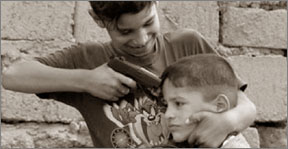|
observer |
|
|
|
|
|
OTHER LINKS |

|

|

|
|
Children of war: The generation traumatised by violence in IraqThe car stopped at the makeshift checkpoint that cut across the muddy backstreet in western Baghdad. A sentry appeared. "Are you Sunni or Shia?" he barked, waving his Kalashnikov at the driver. "Are you with Zarqawi or the Mahdi army?"
"The Mahdi army," the driver said. "Wrong answer," shouted the sentry, almost gleefully. "Get him!" The high metal gate of a nearby house was flung open and four gun-toting males rushed out. They dragged the driver from his vehicle and held a knife to his neck. Quickly and efficiently, the blade was run from ear to ear. "Now you're dead," said a triumphant voice, and their captive crumpled to the ground. Then a moment of stillness before the sound of a woman's voice. "Come inside boys! Your dinner is ready!" The gunmen groaned; the hapless driver picked himself up and trundled his yellow plastic car into the front yard; the toy guns and knives were tossed by the back door. Their murderous game of make-believe would have to resume in the morning. Abdul-Muhammad and his five younger brothers, aged between six and 12, should have been at school. But their mother, Sayeeda, like thousands of parents in Iraq's perilous capital city, now keeps her boys at home. Three weeks ago, armed men had intercepted their teacher's car at the school gates, then hauled him out and slit his throat. Just like in their game. "That day they came home and they were changed because of the things they'd seen," said Sayeeda as she ladled rice into the boys' bowls. "The youngest two have been wetting their beds and having nightmares, while Abdul-Muhammad has started bullying and ordering everyone to play his fighting games. I know things are not normal with them. My fear is one day they will get hold of real guns. But in these times, where is the help?" The boys live with their widowed mother and uncle in a modest family house in al-Amil, a once peaceful, religiously mixed suburb in western Baghdad that is yielding to the gunmen, street by street. Similar tales of growing up in the war zone are heard across the country. Parents, teachers and doctors contacted by the Guardian over the past three months cite a litany of distress signals sent out by young people in their care - from nightmares and bedwetting to withdrawal, muteness, panic attacks and violence towards other children, sometimes even to their own parents. Amid the statistical haze that enshrouds civilian casualties, no one is sure how many children have been killed or maimed in Iraq. But psychologists and aid organisations warn that while the physical scars of the conflict are all too visible - in hospitals and mortuaries and on television screens - the mental and emotional turmoil experienced by Iraq's young is going largely unmonitored and untreated. The country's overstretched hospitals cannot cope with psychological trauma and many of the best doctors have either fled the country or been killed. The problems are compounded by the stigma that psychological and psychiatric care carries. "They don't bring their children in for treatment, fearing they will be labelled as mad," Dr Karachatani said. The field is left to small local and foreign NGOs and to hard-pressed Iraqi psychologists, who are not immune to bloodshed. In December, Harith Hassan, one of Iraq's most prominent child psychologists, was shot dead as he drove to work. A regular commentator in the Iraqi media known for his ruthlessly honest comments about the Iraqi mindset, Dr Hassan had worked with victims of trauma. And he had been determined to wean Iraqi youth from their obsession with the gun. "It's all some of them think about and know," he had told the Guardian. "The dangers are they will internalise the violence and then reproduce it later." Yet in Baghdad's al-Amil neighbourhood that is not easy. Haunted by the spectre of violence, parents have stopped taking their children to local play areas. The neighbourhood's two amusement arcades are shuttered and there are few safe places to play sports. School attendance is down by as much as 60%. Lynne Jones, a child psychiatrist with the International Medical Corps who studied children under war in Bosnia, said: "Children are often incredibly resilient. In a number of studies, trauma in children in war zones has tailed off quite rapidly once the violence dies down." Their continued wellbeing depends on the kind of environment in which they live after that, and the values of their families or parents, she said. Shortly before his murder, Dr Hassan told the Guardian of his fears for Iraq's current young generation. "Do not make the mistake of blaming the occupation and the recent war for all of this," he said. "For more than three decades, young Iraqis have been forced to learn how to kill. We must now learn instead about dialogue and compromise. Otherwise, we will continue to produce psychopathic personalities for whom violence is simply a means of negotiating daily life." Guardian Unlimited |








